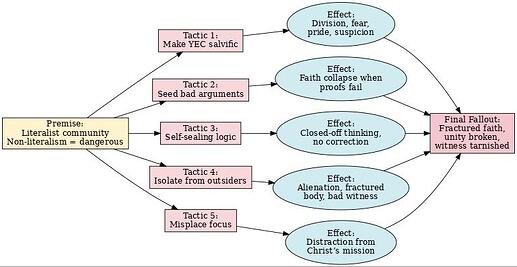- It so happens that, in a previous, interrupted attempt to get ChatGPT’s input on Satan’s tactics, ChatGPT gave me this diagram of Satan’s “tactical strategy”:
The diagram illustrates how, under Burrawang’s literalist premise, “maximum damage” could be achieved by promoting Young Earth Creationism.
It breaks the strategy into five tactics (make YEC salvific, seed bad arguments, self-sealing logic, isolate from outsiders, misplace focus), each producing specific damaging effects (division, bad witness, distraction, etc.), which then converge into the final fallout: fractured faith, broken unity, and a tarnished witness.
It’s essentially a visual unpacking of the reasoning we discussed earlier — showing that if Satan’s goal is eventual implosion of a literalist community, YEC promotion is a potent wedge.
Here’s a breakdown of each tactic in that diagram, tied to Burrawang’s premise and the “maximum damage” goal:
Tactic 1 – Make YEC Salvific
Meaning: Redefine or imply that believing in Young Earth Creationism is a requirement for salvation or proof of genuine faith.
Mechanism: Treat YEC not as a secondary or disputable matter, but as a core gospel issue.
Damage:
- Creates division between YEC believers and Christians who interpret Genesis differently.
- Fosters fear (“If I doubt YEC, I might be rejecting God”).
- Breeds pride among YEC adherents (“We’re the true believers”).
- Seeds suspicion toward anyone who doesn’t hold YEC.
Why effective: Makes disagreement a salvation issue—maximizing fractures inside the community.
Tactic 2 – Seed Bad Arguments
Meaning: Equip believers with poor, easily refuted YEC arguments and misrepresented science.
Mechanism: Encourage them to confidently use flawed evidence (e.g., discredited dating methods, misquotes from scientists).
Damage:
- When such “proofs” are debunked, faith may collapse because believers equated the truth of Christianity with those arguments.
- Outsiders see the faith as intellectually dishonest.
Why effective: A brittle, all-or-nothing apologetic ensures that disproving one claim can unravel a believer’s confidence.
Tactic 3 – Self-Sealing Logic
Meaning: Create an interpretive bubble where any counter-evidence is automatically dismissed as deception.
Mechanism: Frame contrary evidence as part of a satanic or secular conspiracy; label dissenters as compromisers.
Damage:
- Produces closed-off thinking—no correction or refinement possible.
- Locks the group into a defensive, adversarial posture toward both outsiders and reformers.
Why effective: Prevents healthy self-correction, ensuring that bad arguments persist and skepticism deepens among those who leave.
Tactic 4 – Isolate from Outsiders
Meaning: Limit engagement with people, scholarship, and evidence outside the YEC circle.
Mechanism: Warn that interacting with non-YEC Christians or scientists is spiritually dangerous.
Damage:
- Alienates believers from the broader Christian world and from credible science.
- Produces a fractured body of Christ, with no bridge-building.
- Weakens public witness by appearing fearful and insular.
Why effective: Cuts off the flow of corrective ideas, reinforcing the echo chamber.
Tactic 5 – Misplace Focus
Meaning: Shift the community’s energy from Christ’s mission to defending YEC as the front line of faith.
Mechanism: Present evangelism, discipleship, and worship as dependent on winning the creation debate.
Damage:
- Distracts from the gospel’s core message.
- Warps priorities so that defending a chronology eclipses living out Christian love and service.
Why effective: Even if the group remains united in YEC, their main energy is misdirected, blunting their effectiveness.
Summary:
Together, these tactics form a reinforcing system:
- Make YEC salvific → raises the stakes.
- Seed bad arguments → ensures collapse when challenged.
- Self-sealing logic → prevents correction.
- Isolation → keeps errors safe from outside input.
- Misplaced focus → diverts the mission entirely.
All roads lead to the Final Fallout: fractured faith, broken unity, tarnished witness.

